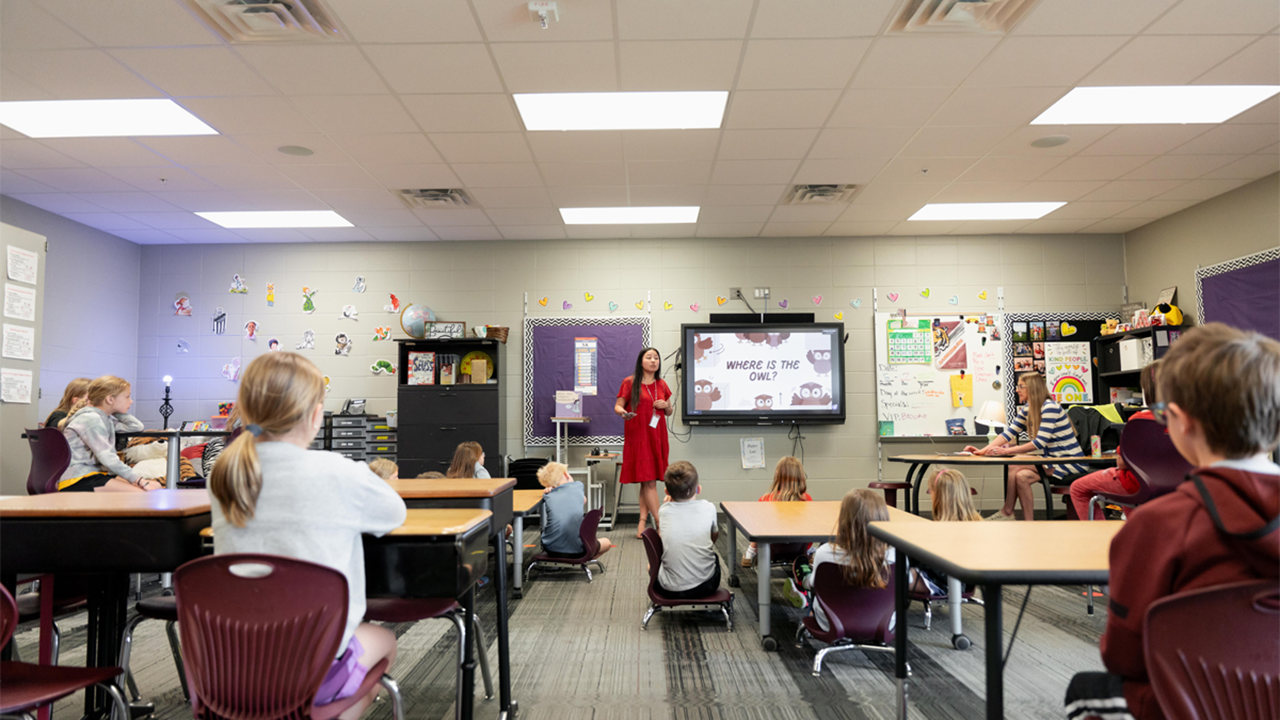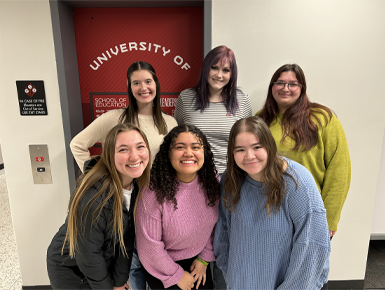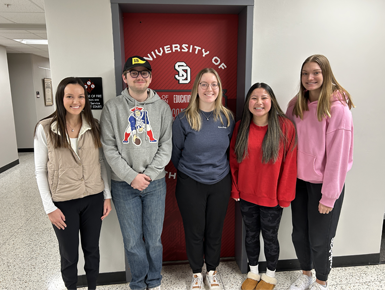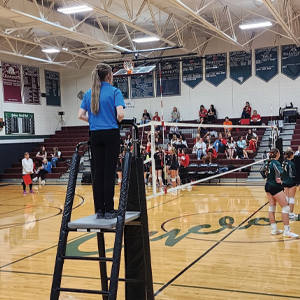From the Classroom to the Field: School of Education Answers the Call for a Prepared Workforce

Through its yearlong residency, strong partnerships and alternative certification programs, the School of Education is helping fill critical workforce gaps.
By combining hands-on experience with flexible, career-focused pathways, USD is preparing its graduates not only to step confidently into classrooms and communities, but to lead them.
Training Workforce-Ready Graduates
In the School of Education, future educators are getting the hands-on experiences they need to become highly trained, effective professionals. They engage in learning in and beyond the classroom—combining a foundation in theory and evidence-based practice with real-world experiences.
“USD School of Education students are in the workforce at the same time they are earning course credit and receiving support from mentors in the schools and at USD,” said Jacqueline Wilber, Ed.D., director of student and professional services at the School of Education. “We’re very well integrated with career development and experience in the field, pairing it with the best practices in coursework and theory.”
Through the yearlong residency—which incorporates a full year of teaching experience into a student’s four-year program—students graduate with more confidence and a wide range of experiences.
Elena Whalen ’25, a secondary English education graduate, spent her teacher residency at the Harrisburg School District, first at the Harrisburg Freshman Academy and then at Harrisburg North Middle School. Through direct classroom experience, Whalen feels more confident in her teaching abilities.
“I’m entering my first year of teaching with basically an entire year under my belt already,” said Whalen, who accepted an English teacher position at Boyden-Hull High School in Hull, Iowa. “In addition to my multiple student teaching placements, they allowed me multiple days of observations in other classrooms and buildings. The School of Education trusted me to know what experience I still needed and allowed me to act on this need. Because of that, I feel about as prepared as any first-year teacher could be.”
Paired with both a teacher and a USD faculty mentor, students completing their yearlong residencies have the chance to truly understand their classroom, the school and the communities they join.
“Students experience the breadth of school life,” Wilber said. “Spending an entire year in the school system allows teacher residents to recognize where help is needed—and to take initiative. From coaching and tutoring to substitute teaching and filling other support roles, they gain valuable experience while making a meaningful impact on the school community."
For example, Carly Clark ’25, a physical education graduate, stepped in as head coach of the Roosevelt High School dance team when the previous coach resigned.
"My experience at Roosevelt High School with the dance team was great. The girls were awesome, and it was great doing what I love,” said Clark. “I learned so much more through being the head coach and am excited to grow in the field even more.”
Secondary English education graduate Anna Risty ’25 coached the One-Act play at Lincoln High School while she was a teacher resident.
“My experience was nothing short of amazing,” Risty said. “The students were so welcoming and kind.”
Teacher residents can also fill a critical need for substitute teachers. Programs like the Sioux Falls School District’s Learn and Earn and the Harrisburg School District’s 4+1 allow students to earn income and gain experience across different grades and subject areas, while also providing the school districts with convenient, prepared substitute teachers.
Brooke Creviston ’25, an elementary education graduate, appreciated the opportunity to earn an income while getting additional teaching experience. Creviston spent her yearlong residency in the Sioux Falls School District and substitute taught one day per week.
“With student teaching residency being a yearlong commitment that mirrors a full-time job and completing coursework, it can be challenging—if not impossible—to balance additional work schedules,” Creviston said. “Through the Learn and Earn program, substitute teaching was easily manageable because of their flexible nature and adherence to USD’s student teaching program.”
Creviston gained valuable, hands-on experience in a variety of classroom settings, building confidence, adaptability and meaningful connections across the district.
“The opportunity to have days in the classroom with just me and the students was incredibly important for my development as an educator,” said Creviston, who accepted a teaching position in the Sioux Falls School District for the coming academic year. “I could practice being the sole educator in the classroom and experience what that could look like in the future.”
Whalen participated in the 4+1 program, substitute teaching for middle school and high school science, math and social studies as well as extracurriculars and even a kindergarten classroom.
“The 4+1 program provided me with invaluable teaching experience that I wouldn’t have otherwise gotten,” said Whalen. “This program helped me to feel more like a trusted professional in my district rather than solely a student teacher. It was affirming to be trusted not only to lead a classroom but also to be given the freedom to choose when and where I subbed.”
After spending time with various age groups and gauging her strengths and preferences, the 4+1 program helped Whalen realize that she enjoyed teaching upper-level English classes.
Opening Door for School Staff and Career Changers
As part of its efforts to ease the teacher shortage, the USD School of Education is reaching both individuals who are already working in schools and want to advance their education as well as those who are looking to change careers.
For individuals who hold a bachelor’s degree and would like to become a teacher, the School of Education offers master’s degrees plus certification in elementary education, secondary education and special education.
“The School of Education is really taking up the charge. No one else in the state or region offers these kinds of program, and we have really great partnerships with school districts in the state,” said School of Education Dean Amy Schweinle, Ph.D. “We want to help them invest in their employees and their community while getting the folks that they know would be great teachers into the classrooms.”
Partnering with school districts across South Dakota, the USD School of Education’s Professional Development Center program offers customized training for educators or professionals in the school system who are seeking additional certification. The training is offered in a cohort model, and with support from the national Prepared to Teach organization, participants can receive funding to help cover the cost of tuition.
The program got its start in Brookings, South Dakota, where USD faculty teamed up with the Brookings School District to help existing teachers pivot into special education.
“Those participants were already certified teachers in other areas who became special education teachers to meet district needs,” said Wilber.
The Brookings cohort included about 20 people and, after completing the program, all retained their employment within the district, with eight serving in a special education role.
“The USD PDC program was a great experience for our staff to gain foundational knowledge and experience to become successful special education teachers,” said Heather Asmussen, director of special services in the Brookings School District.
Building on that success, the USD School of Education partnered with the Sioux Falls School District to fill their special education teacher needs. Participants included those who were already working in schools, such as paraeducators, lunchroom staff, substitute teachers and front-office personnel.
Twenty-seven of those students will graduate this December with a master’s degree with special education certification; 14 have already been hired as special education teachers.
More cohorts are on the way, with a new group of 25 students in Sioux Falls this summer. In addition to special education, this group will include elementary and secondary education candidates, helping address general teacher shortages in those areas.
“The University of South Dakota has been incredible in adapting programming or in creating new programming to fit the needs of our community, region and state,” said James Nold, Ed.D., superintendent of the Sioux Falls School District. “When we have an idea, they are willing to listen and see what fits. It is a great way for our staff to advance their careers, and it was made possible by USD and their willingness to work with us to remove barriers to the fulfillment of our staff’s goals.”
Additionally, the Harrisburg School District tapped into the School of Education’s expertise when they adopted the Science of Reading initiative and needed more reading specialists and literacy coaches. Through the PDC program, USD offered educators the opportunity to earn a master’s degree with a specialization in reading and literacy.
“The PDC program through USD made it possible for me to advance my learning and knowledge in the field of literacy while still teaching full time,” said Lynn Lape, an educator in the Harrisburg School District who will complete the program in December. “The coursework was beneficial to my current teaching and expanded my knowledge base in many areas of literacy instruction. The guidance provided by the advisors in the PDC program made the entire process smooth.”
Similar to the PDC program, the USD School of Education offers an alternative teacher certification for individuals who are interested in becoming a teacher outside a traditional preparation program.
“These are the second-career folks who are skilled in an area, established in their communities and want to give back by becoming a teacher,” said Wilber. “USD now offers these programs online, so people can keep working while they make their career change. It’s an outstanding opportunity, and USD is the only university in South Dakota and the surrounding area to offer it.”
Addressing the Referee Shortage
Outside of traditional teaching roles, the USD School of Education is also making an impact on other workforce shortages, including the state’s referees.
With only 1,700 officials in South Dakota, school districts in the state—particularly in rural areas—have had to cancel or reschedule games.
Recognizing potential in college students, the South Dakota High School Activities Association contacted the USD School of Education to design a program that trains students to become certified sports officials.
Offered every semester, the program gives students the opportunity to earn course credit and gain certification to officiate sports like football, basketball and volleyball.
“It’s a great way for students to earn money while they’re in college,” said Jessie Daw, Ph.D., chair of the USD Division of Kinesiology & Sport Management. “They can set their own schedule, the pay is really good, and they can start to develop skills like decision making and managing conflict that they can put on their resumes.”
Participation from USD’s students has been successful since the program began in the spring of 2024. Sixteen students participated in the officiating volleyball course; 31 in the officiating football course; and 14 in the officiating basketball course, with 13 who have already enrolled for the upcoming semester.
“As the demand for high school sports officials continues to grow, we’re proud to partner with the SDHSAA to help address this critical shortage,” Daw said. “This collaboration gives our students a unique training opportunity while filling a need in high school sports across the state and beyond.”
Summer Seefeldt, a rising junior kinesiology and sport management major, was inspired to take the officiating volleyball course after hearing from a volleyball official explaining the need in the state.
Since becoming a registered official, Seefeldt has officiated high school games in her hometown of Clark, South Dakota, and Amateur Athletic Union games at the Sanford Pentagon in Sioux Falls. She also has served as a line judge at Mount Marty University, and this fall she will line judge at the University of Sioux Falls, Augustana University and Briar Cliff University.
“Officiating has helped support me by being my main source of income,” Seefeldt said. “It pays well, I can choose when and where I want to work, it’s fun and it has allowed me to meet a bunch of great people.”
Building A Stronger Education Workforce
Whether they’re gaining firsthand experience through residencies and support roles, advancing their education or shifting careers, USD School of Education graduates are making a difference in their schools. They are filling gaps, building relationships and strengthening communities across South Dakota and beyond.
“At the University of South Dakota School of Education, we are proud to be leading the way in preparing a workforce that meets the urgent needs of our state and region,” said Schweinle. “Through innovative programs, strong partnerships and a deep commitment to experiential learning, we are not only filling classrooms—we are empowering future educators to thrive in them. Our graduates are stepping into schools with confidence, purpose and a passion for service, and that’s exactly what our communities need right now.”






